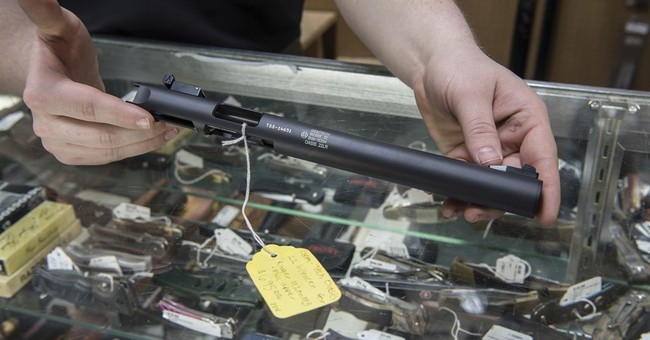By Matt Vespa
When we use to do range day at the National Rifle Association (NRA), one of my favorite firearms the organization provided to us was a suppressed 1911. The suppressor is not a “silencer,” and it won’t turn you into a hitman, despite the anti-gun Left’s very silly propaganda on this subject. If anything, this item should be stripped from the National Firearms Act.
To purchase one, you need to pay the tax stamp, go through a lengthy and arduous background check process, and have your name added into a federal database managed by the Bureau of Alcohol, Tobacco, Firearms, and Explosives (ATF). It shouldn’t have to be this way, but the regulation exists, and while states are passing suppressor laws of their own, gun owners should be very cautious when thinking about dabbling in purchases that are outside of federal regulations, according to Stephen Gutowski of The Reload.
And by very cautious, he means to stay clear of it—totally.
Some have tried to purchase a silencer and then found themselves ensnared in a years-long legal fight that ended with devastating convictions. Gutowski added that the legal basis for these state laws conflicting with federal law has been shredded at every level of the judiciary, so unless you want to go to jail for an extended period of time, Texans—don’t try it (via The Reload):
In 2014, Cox sold Kettler an unregistered silencer after Kansas passed its own law purporting to put the devices beyond federal reach. The sale tangled the two men in a years-long ordeal that ended with life-altering federal convictions for both. And, in 2019, the Supreme Court left those convictions in place when it declined to hear their case.
“I was just collateral damage in this dispute between the state and federal government,” Kettler, now a federal felon serving three years on probation, said after the Court’s decision. He blamed Kansas lawmakers for setting up residents like him to be prosecuted by passing a misleading law.
Anyone telling Texans a state silencer law will protect them from federal prosecution without giving them fair warning of the likely outcome is merely leading them into the same trap, with a lifetime ban on gun ownership waiting at the end of the line.
[…]
Texas lawmakers don’t agree there should be a registry and tax on silencers. And they don’t think the federal government should have a say over commerce that happens entirely within their borders. So, in a move that’s becoming a bit of a trend in red states, they passed a bill claiming Congress has no power to regulate silencers made and sold inside the state.
[…]
The theory is an appealing one: Commerce that takes place entirely within a state’s boards and among its residents doesn’t fall under Congress’s authority to regulate commerce between the states. As Kevin Williamson recently argued in National Review, adopting that reading of the Constitution could even lessen polarization in American politics.
“Resurrecting a more robust model of federalism — recognizing that New Jersey can be New Jersey while Texas is Texas — could help to dissipate some of the culture-war energy that has made our politics, especially our presidential elections, such a horror-show in recent years,” he wrote.
Unfortunately for proponents of this argument, as Williamson notes, it has a terrible track record in court. About a decade after the NFA passed, the Supreme Court decided Wickard v. Filburn. It upheld a conviction against Roscoe C. Filburn for violating federal restrictions on wheat production based on the idea that even growing wheat for his own use on his own farm meant Filburn was impacting interstate commerce. The Court hasn’t backpedaled since, and even conservative icon Justice Antonin Scalia used similar reasoning in 2005’s Gonzales v. Raich to uphold federal prohibitions against marijuana grown and sold entirely within California.
It’s not worth the risk. This is going to be a long fight. All fights centering on gun rights tend to be lengthy duels, but going about this way, albeit tedious, avoids jail time and the loss of your gun rights.
For now, the ATF and the federal government are dead set in keeping the suppressor regulation in place, even conservative judges aren’t really looking to rock the boat. And we shouldn’t be looking to the courts to change this aspect of gun law. This is a legislative fight. Passing a new federal law, however, is the best route. It’s been attempted but fallen way short in years past. As the late Justice Scalia often said about people clamoring for change, just pass a law. Elections and ballot boxes are where the change comes from, not judges. It’s a winnable fight. It just might take some time.

